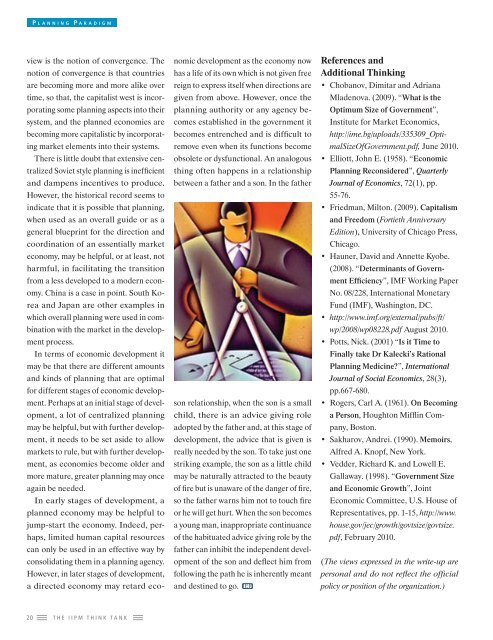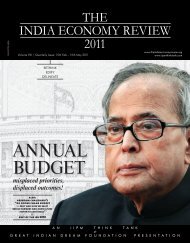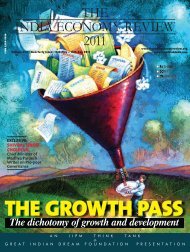Download - The India Economy Review
Download - The India Economy Review
Download - The India Economy Review
Create successful ePaper yourself
Turn your PDF publications into a flip-book with our unique Google optimized e-Paper software.
P LANNING P ARADIGM<br />
view is the notion of convergence. <strong>The</strong><br />
notion of convergence is that countries<br />
are becoming more and more alike over<br />
time, so that, the capitalist west is incorporating<br />
some planning aspects into their<br />
system, and the planned economies are<br />
becoming more capitalistic by incorporating<br />
market elements into their systems.<br />
<strong>The</strong>re is little doubt that extensive centralized<br />
Soviet style planning is ineffi cient<br />
and dampens incentives to produce.<br />
However, the historical record seems to<br />
indicate that it is possible that planning,<br />
when used as an overall guide or as a<br />
general blueprint for the direction and<br />
coordination of an essentially market<br />
economy, may be helpful, or at least, not<br />
harmful, in facilitating the transition<br />
from a less developed to a modern economy.<br />
China is a case in point. South Korea<br />
and Japan are other examples in<br />
which overall planning were used in combination<br />
with the market in the development<br />
process.<br />
In terms of economic development it<br />
may be that there are different amounts<br />
and kinds of planning that are optimal<br />
for different stages of economic development.<br />
Perhaps at an initial stage of development,<br />
a lot of centralized planning<br />
may be helpful, but with further development,<br />
it needs to be set aside to allow<br />
markets to rule, but with further development,<br />
as economies become older and<br />
more mature, greater planning may once<br />
again be needed.<br />
In early stages of development, a<br />
planned economy may be helpful to<br />
jump-start the economy. Indeed, perhaps,<br />
limited human capital resources<br />
can only be used in an effective way by<br />
consolidating them in a planning agency.<br />
However, in later stages of development,<br />
a directed economy may retard eco-<br />
20 THE IIPM THINK TANK<br />
nomic development as the economy now<br />
has a life of its own which is not given free<br />
reign to express itself when directions are<br />
given from above. However, once the<br />
planning authority or any agency becomes<br />
established in the government it<br />
becomes entrenched and is diffi cult to<br />
remove even when its functions become<br />
obsolete or dysfunctional. An analogous<br />
thing often happens in a relationship<br />
between a father and a son. In the father<br />
son relationship, when the son is a small<br />
child, there is an advice giving role<br />
adopted by the father and, at this stage of<br />
development, the advice that is given is<br />
really needed by the son. To take just one<br />
striking example, the son as a little child<br />
may be naturally attracted to the beauty<br />
of fi re but is unaware of the danger of fi re,<br />
so the father warns him not to touch fi re<br />
or he will get hurt. When the son becomes<br />
a young man, inappropriate continuance<br />
of the habituated advice giving role by the<br />
father can inhibit the independent development<br />
of the son and defl ect him from<br />
following the path he is inherently meant<br />
and destined to go.<br />
References and<br />
Additional Thinking<br />
• Chobanov, Dimitar and Adriana<br />
Mladenova. (2009). “What is the<br />
Optimum Size of Government”,<br />
Institute for Market Economics,<br />
http://ime.bg/uploads/335309_OptimalSizeOfGovernment.pdf,<br />
June 2010.<br />
• Elliott, John E. (1958). “ Economic<br />
Planning Reconsidered”, Quarterly<br />
Journal of Economics, 72(1), pp.<br />
55-76.<br />
• Friedman, Milton. (2009). Capitalism<br />
and Freedom (Fortieth Anniversary<br />
Edition), University of Chicago Press,<br />
Chicago.<br />
• Hauner, David and Annette Kyobe.<br />
(2008). “Determinants of Government<br />
Effi ciency”, IMF Working Paper<br />
No. 08/228, International Monetary<br />
Fund (IMF), Washington, DC.<br />
http://www.imf.org/external/pubs/ft/<br />
wp/2008/wp08228.pdf August 2010.<br />
• Potts, Nick. (2001) “ Is it Time to<br />
Finally take Dr Kalecki’s Rational<br />
Planning Medicine?”, International<br />
Journal of Social Economics, 28(3),<br />
pp.667-680.<br />
• Rogers, Carl A. (1961). On Becoming<br />
a Person, Houghton Miffl in Company,<br />
Boston.<br />
• Sakharov, Andrei. (1990). Memoirs,<br />
Alfred A. Knopf, New York.<br />
• Vedder, Richard K. and Lowell E.<br />
Gallaway. (1998). “Government Size<br />
and Economic Growth”, Joint<br />
Economic Committee, U.S. House of<br />
Representatives, pp. 1-15, http://www.<br />
house.gov/jec/growth/govtsize/govtsize.<br />
pdf, February 2010.<br />
(<strong>The</strong> views expressed in the write-up are<br />
personal and do not reflect the offi cial<br />
policy or position of the organization.)





